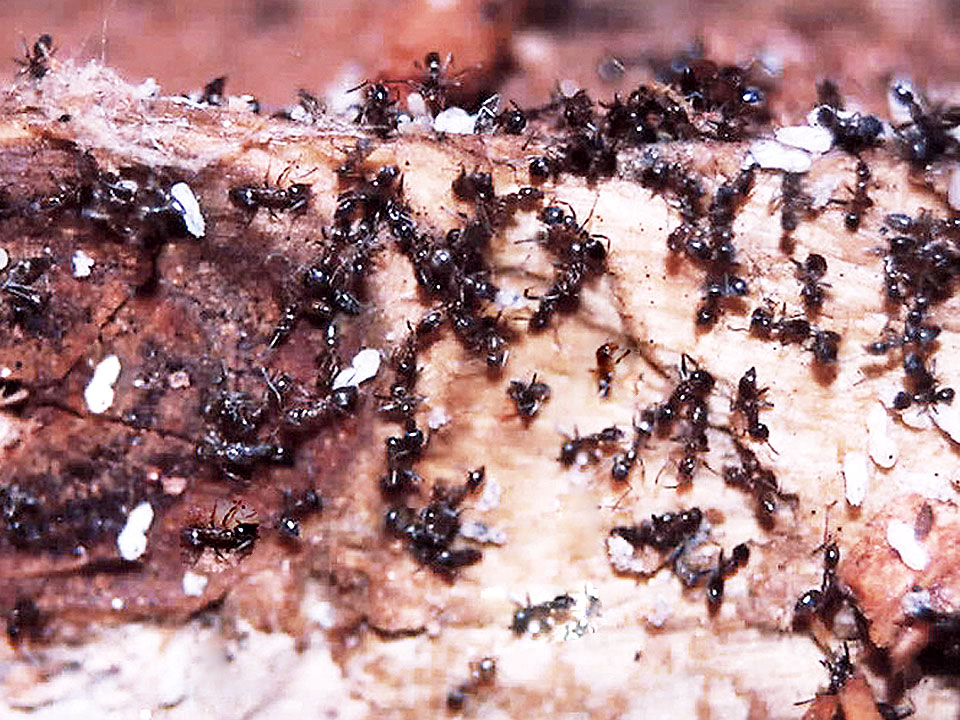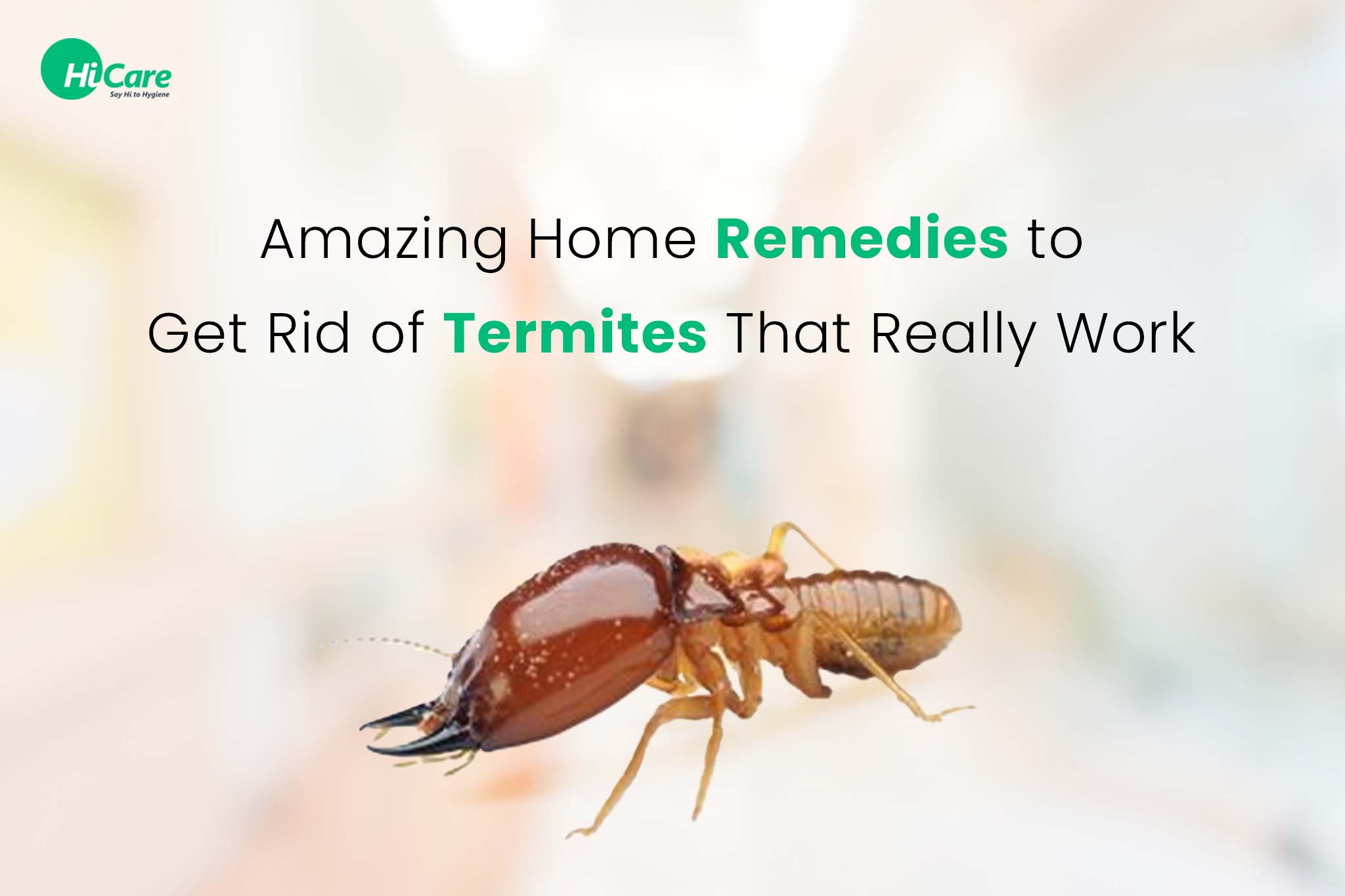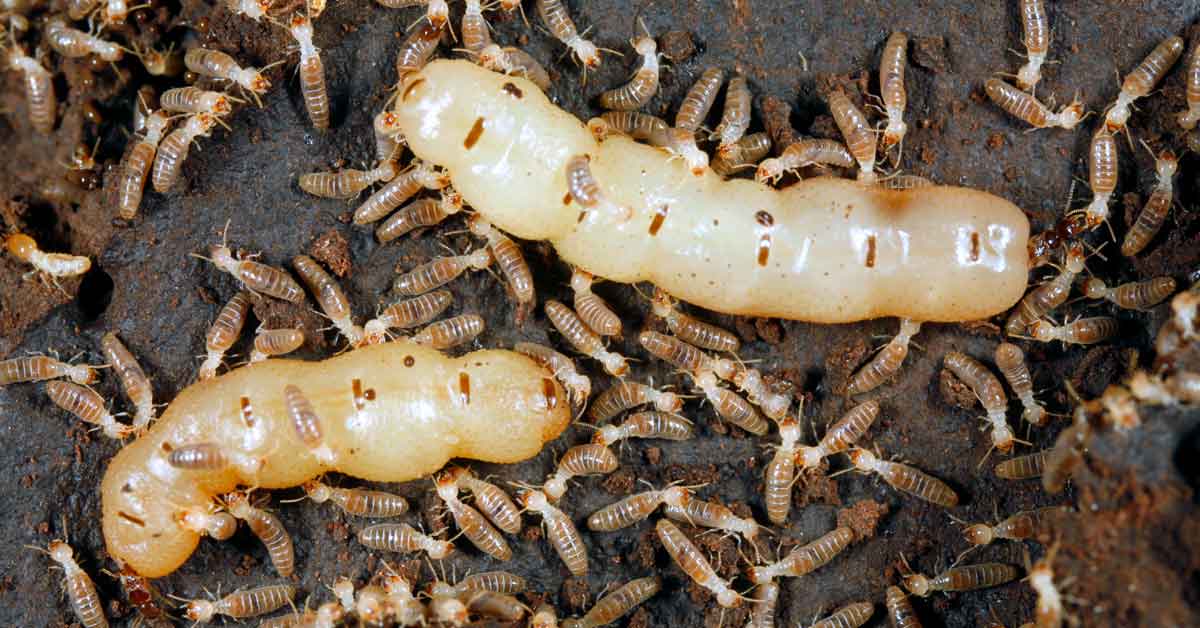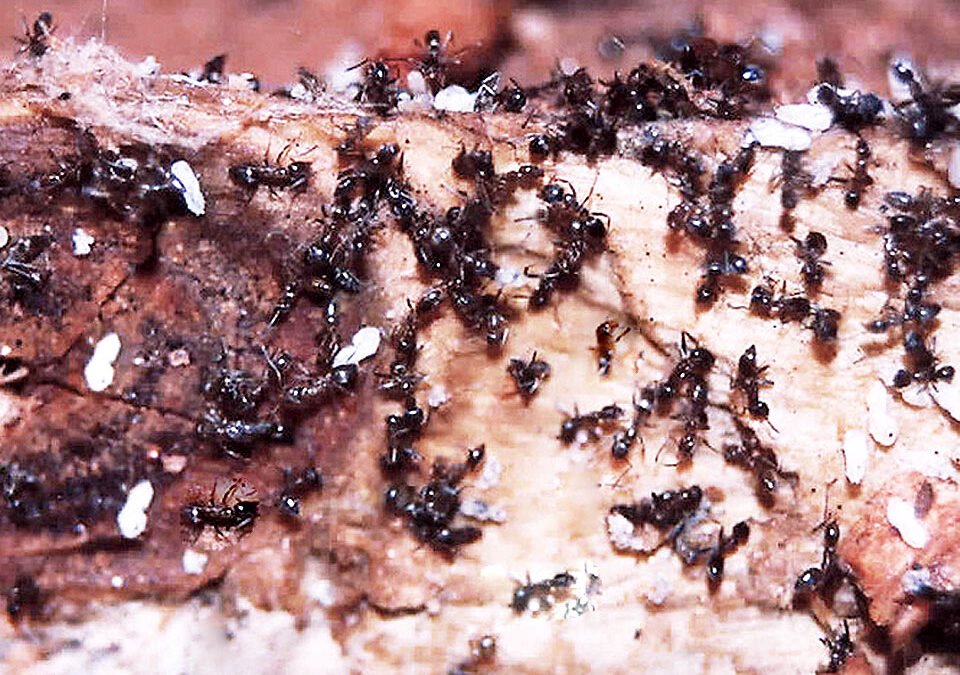Most ant sprays are not formulated to kill termites, as these pests require different treatment methods. Ant spray may temporarily incapacitate or kill some termites, but it won’t eliminate an infestation.
Dealing with pests in your home can be a challenge, especially when it comes to distinguishing between ants and termites. Homeowners often reach for readily available ant sprays hoping to address what they suspect to be an ant problem, which might actually be a termite infestation.
These two pests, while similar in some respects, require different approaches for effective control and eradication. The biology and behavior of termites make them particularly resistant to methods that work on ants. Therefore, proper identification and targeted treatments are crucial for successful pest management. Ant sprays might knock down termites on contact but lack the residual effects needed to deal with the colony hidden within the structure of your home. For comprehensive termite control, it’s recommended to consult with professional pest control services that can provide specialized termite treatments and prevention strategies.

Credit: www.chemfreeexterminating.com
Introduction To Termite Infestations
Finding termites in your home can be alarming. Often mistaken for harmless ants, termites pose a serious risk to the structure of houses and furniture. Understanding these silent invaders is crucial for homeowners. It is key to identify the threat early and take action to protect your property.
Recognizing Signs Of Termites
- Discarded Wings: Swarmers lose their wings after finding a mate.
- Mud Tubes: Termites build these to shield themselves.
- Hollow Sounds: Tapping on wood that sounds empty may indicate damage.
- Fecal Pellets: These are tiny, and wood-colored.
Understanding Termite Biology And Behavior
Termites are social insects living in colonies. They eat cellulose, found in wood and paper. This makes our homes perfect for their diet. Worker termites forage for food and bring it back to the colony. Recognizing their biology and behavior is the first step in dealing with infestations.
| Type of Termite | Behavior |
|---|---|
| Subterranean | Live underground and create mud tubes |
| Drywood | Live within the wood they consume |
| Dampwood | Prefer wood damaged by moisture |
The Chemistry Of Ant Sprays
Each spray is a mix of chemicals. They work together to stop bugs. These sprays can be complex. They might affect other insects too, like termites.
Active Ingredients In Common Ant Sprays
Ant sprays have powerful parts that kill ants. Many have things like:
- Imiprothrin – Knocks ants down fast.
- Cypermethrin – Stops ants from moving.
- Pyrethroids – These are like nature’s insect stoppers.
Their goal? Stop ants in their tracks.
How Ant Sprays Affect Insects
These sprays mess with the insect’s signals. Ants can’t move or act normal. This can affect termites too. But not all sprays work on all bugs.
Termite bodies are different. They might need different chemicals. It’s like using a key for the wrong lock.
Some sprays make insects dry out. Others make them shake until they can’t move anymore.
Termites Vs. Ants
Termites and ants often get mistaken for each other. These tiny creatures may seem similar, but they are actually quite different. Both have distinct lifestyles and behaviors. This is important when considering pest control methods such as ant spray. Can it really kill termites? Let’s delve into their differences to find out.
Differences In Habitat And Nesting
Termites and ants pick different places to live. Termites love wood. They often hide and make their homes inside it. Ants, on the other hand, prefer the earth or other safe places. They build nests that we can sometimes see.
- Termites:
- Live in and eat wood.
- Create hidden tunnels.
- Stay away from light.
- Ants:
- Build nests in soil or open spaces.
- Gather food to bring back to the nest.
- Are more visible to us.
Varied Vulnerabilities To Insecticides
Ant spray kills ants. But does it work on termites? The truth is, termites need special treatment. Ant spray might not be able to kill termites. Termites have different chemicals inside them that protect them from ant insecticides. This means that termite control usually needs stronger or different chemicals.
| Pest Type | Insecticide Effective? |
|---|---|
| Ants | Yes, ant spray works. |
| Termites | No, not the same way. |
Effectiveness Of Ant Spray On Termites
The question “Will ant spray kill termites?” is common among households grappling with pest problems. Various ant sprays are readily available, but their effectiveness on termites is not as straightforward as one might hope. Exploring the impacts of ant spray on termites can help homeowners understand whether this method is a viable solution for termite control.
Immediate Impacts On Termites
Ant sprays can sometimes stun or kill termites on contact. In the short term, the application of ant spray to termites may have the following effects:
- Immediate knockdown: Some termites may be incapacitated quickly.
- Visible reduction: A decrease in the number of active termites may be noticeable.
However, these effects are often temporary and may not reach the colony deep inside wood structures.
Long-term Efficacy And Limitations
For long-term control, understanding the limitations of ant spray is crucial:
| Aspect | Efficacy | Limitation |
|---|---|---|
| Persistence | May repel termites briefly | Lacks residual action |
| Colony impact | Limited or none | Does not target queen or colony |
| Application | Simple to use | May not penetrate deep nests |
Most ant sprays do not provide a lasting solution against termites. They fail to reach the core of the termite colony which is essential for complete elimination. Professional termite treatments are geared toward total colony eradication and often more successful long-term.
Professional Pest Control Options
Discovering a termite problem can be worrying. Ant spray might not be the answer. Professional pest control provides effective solutions. Experts in this field have the tools and knowledge. They tackle termite infestations head-on. With professional help, your home can be termite-free. Let’s explore professional options available to you.
Termite-specific Treatments
Professionals use treatments designed for termites. Ant sprays are not the same. Termite treatments target the colony’s structure. This ensures the infestation is dealt with properly.
- Bait systems draw termites away from your home.
- Liquid termiticides create barriers to protect your property.
- Fumigation covers severe infestations where others fail.
- Wood treatments apply chemicals directly to affected areas.
Benefits Of Professional Assessment
Professionals assess the termite damage accurately. DIY sprays may miss hidden issues. Experts check your home’s structure. They find the extent of the infestation. This assessment leads to tailored termite control strategies. You get peace of mind.
| DIY Approach | Professional Service |
|---|---|
| Potentially ineffective | Targeted treatments |
| General use | Specific to termites |
| Limited knowledge required | Expert assessment |
| No follow-up | Continued support |
Choosing professionals offer benefits:
- They identify all termite species.
- They use the latest control methods.
- They provide warranties on their service.
Preventive Measures Against Termites
Discovering termites can be a nightmare for any homeowner. The key to avoiding the costly damage these pests can inflict lies in early prevention. When you stop termites from settling in your space, you maintain the integrity of your home. Let’s explore how to create a barrier against the silent invaders with effective cultural practices and pre-treatment strategies.
Cultural Practices To Deter Termites
Creating an environment that’s unattractive to termites is a powerful first line of defense. Here are some cultural habits to integrate:
- Maintain a dry home: Termites thrive in moisture. Fix leaks fast.
- Wood and ground should part ways: Keep wood, mulch, and soil apart to prevent termite crossings.
- Regular inspections: Check decks and fences for damage.
- Clean gutters: Prevent water and leaf build-up near your roof.
- Trim trees and shrubs: They should not touch your home and give termites a path.
Pre-treatment Strategies For New Constructions
To safeguard your new construction from termites, employ these strategies:
| Strategy | Benefit |
|---|---|
| Soil Treatment | Cuts off entry points for termites |
| Physical Barriers | Blocks termite access |
| Borate Wood Treatment | Makes wood indigestible to termites |
| Termite Resistant Materials | Repels termites naturally |
Homeowner Tips For Dealing With Termites
Discovering termites in your home can be stressful. These silent destroyers can cause extensive damage before you even realize they’re there. Understanding your enemy is the key to effective control. With the correct strategies, you can tackle a termite problem head-on or prevent one from happening at all. Let’s explore both DIY solutions and recognize the moment professional help becomes necessary.
Diy Termite Control Methods
Preventative measures and early treatment are vital in termite control. Here are steps to manage these pests yourself:
- Inspect your property regularly for termite activity.
- Use boric acid as a natural pesticide.
- Consider diatomaceous earth for eco-friendly termite control.
- Repair leaks to avoid moisture buildup which termites love.
- Keep firewood, lumber, and paper away from your home’s foundation.
Note: DIY methods can provide temporary relief but may not eradicate the problem.
When To Call The Professionals
While homeowner efforts help, some scenarios require professional termite control. Look out for these signs:
- Extensive damage that needs structural repair.
- Swarming insects inside your home or from the soil around your house.
- Mud tubes on exterior walls indicating a larger infestation.
Professionals have access to more potent treatments and can offer guarantees on their work. If you’re faced with an overwhelming termite issue, it’s best to call experienced pest control. They’ll assess the infestation and implement the most effective treatment plan.

Credit: hicare.in
Environmental Considerations
Thinking about the environment is key when battling pests like termites. Let’s explore how ant spray impacts our surroundings and discover better choices for our planet.
Impact Of Insecticides On Ecosystem
Insecticides can harm more than just termites. These chemicals might upset the balance of our ecosystems. They affect non-target species, such as bees, butterflies, and other beneficial insects. Even small doses can be lethal or disrupt breeding, navigation, and foraging behaviors. Insecticides can also seep into soil and water, potentially harming plants, fish, and water sources.
Choosing Eco-friendly Pest Solutions
To protect our environment, we shouldn’t just grab any spray. Eco-friendly options should be our go-to. These solutions focus on limiting negative effects on the planet. Look for products labeled as “non-toxic” or “natural.”
- Beneficial nematodes target specific pests without affecting other creatures.
- Botanical insecticides break down quickly and reduce long-term residue.
- Physical barriers, like sand or diatomaceous earth, keep termites out without chemicals.
Choosing the right method protects the Earth and keeps our homes termite-free.

Credit: www.amdro.com
Frequently Asked Questions Of Will Ant Spray Kill Termites
Can Ant Spray Effectively Eliminate Termites?
No, ant spray is not typically formulated to kill termites. Termites require specific insecticides that target their unique biology and behavior. Ant sprays may kill a few termites on contact but are ineffective for long-term termite control.
Are Termite Infestations Treated Differently Than Ants?
Yes, termite infestations are treated differently than ants. Termites need specialized treatments like bait systems or termiticides that target their colonies. Ant treatments usually involve different types of baits, sprays, and perimeter defenses.
What Are The Signs Of Termite Presence In Homes?
Signs of termite presence include discarded wings, mud tubes on walls, wood that sounds hollow when tapped, and visible damage to wood structures. If you notice these signs, it is important to contact a pest control professional.
How Do Professionals Exterminate Termites?
Professionals exterminate termites using a range of methods like liquid termiticides, bait stations, and fumigation. They choose the best method based on the termite species, infestation severity, and home structure.
Conclusion
Wrapping up, it’s clear that ant spray is not the best solution for termites. Termite infestations require targeted treatments. For lasting results, professionals or specific termite products are necessary. Protect your home by choosing the right pest control method. Remember, effective termite management is key.

I’m MD Tanvir, and I bring years of expertise gained from working closely with pest control companies to the forefront. My journey in the industry has inspired me to launch Bug Battler, a platform aimed at equipping people with the know-how to combat pests autonomously. Through Bug Battler, I aim to empower individuals with practical insights to tackle pest infestations effectively.

